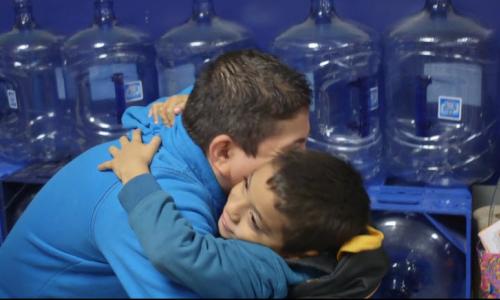Tell us about your current role and the students you serve.
I am a school psychologist in Dallas, Texas. I work with regular education students in all grades who are facing emotional or behavioral difficulties.
What do we know in general about the stresses that immigrant students and families face?
As you can imagine, the process of adapting to a new language and culture is stressful for any immigrant family. Additionally, parents and children often enter the country at different times, which causes added stress in their relationships. There are also differences in how quickly parents and children adapt to the new culture, which affects family roles. Many immigrants, particularly if they are refugees or come from crime-ridden countries, experience trauma either in their home country or some time before they arrived in their new country. Finally, undocumented immigrant families face the added stress related to the fear of apprehension and deportation.
How is that stress intensifying in the current climate?
For undocumented immigrants, the fear of deportation is causing significant stress. In the past, law enforcement focused its efforts on only deporting those who broke the law, but this no longer seems to be the case. Additionally, those who are in the country with documentation, particularly those from the Middle East, are concerned about their legal status, as well as increased racism and discrimination.
What are some of the barriers to mental health support for immigrants (particularly undocumented immigrants)?
Cost is always a significant barrier for low-income families. When a family can afford services, there are often not services available in their native language. In addition, depending on the culture, there may be a stigma attached to receiving mental health services. Some cultures believe these types of problems are a private family matter, are a sign of a weakness, or can be dealt with by the church or other faith practice.
What are some steps that you and your colleagues are taking to meet students' needs?
As a school psychologist, I am able to provide counseling to children during the school day. This eliminates the cost burden, and as a Spanish-speaker I can meet the needs of most of the immigrant students in my schools. Also, the stigma of counseling is often reduced when it is a service at school instead of at a clinic.
What are some of students' strengths and assets that you're able to draw upon in your work?
Immigrant students are highly motivated to learn and adapt to their new country. They want to make friends, which means being able to speak the language and work within the culture. Because of the challenges they often face coming to the United States, they tend to be resilient when faced with new obstacles.
Why do you think a strengths-based approach is important?
It is critical that we treat their immigrant status as an asset. This will help them gain confidence and take the chances needed to become successful in their new home.
What are some of the counseling strategies that you are currently using?
The strategy that we use depends on the student's culture and background. It's important that immigrant children have a chance to tell their story, which can be done through various methods depending on the age and language skills of the student. Play therapy, narrative therapy, or more informal methods using art or writing can all be used. Students from Asian cultures are often familiar with mindfulness and appreciate these approaches. If the student experienced trauma in their home country or during the immigration process, we may use counseling to work through their experience, if needed, they may need counseling at an outside clinic.
How does the current situation and climate place new kinds of demands on teachers?
Teachers are seeing the effects of deportation fears in a way they have never faced. Students are coming to school afraid that something will happen to them or a family member, or upset because they are already affected. I know children who have witnessed relatives being arrested, or have come home from school to find a relative is detained. Teachers must deal with the emotional effects of these events- children who cry, withdraw, or act out- as well as understanding the needs of the families, who may be concerned that their living situation is jeopardized.
What recommendations do you have for teachers working with immigrant students currently?
My most important recommendation is that teachers help their immigrant students feel safe. We can't control their lives outside the school, but on campus they need to know that nothing will happen to them. Teachers and school staff should also give the same assurance of safety to parents. The other key recommendation is that students know that it's okay if they are upset and they need to cry or express their feelings, either with their teacher or a counselor or other trusted adult.
How can teachers take care of their own mental health during this time?
Teachers often try to be all things for their students, and I see this even more now. They want to do everything possible to support these families. One of my immigrant students recently broke her arm, and the mother was afraid to go to the emergency room in case anyone questioned their immigration status. The teacher was willing to go with them to help them feel safer. While these types of behaviors are admirable, teachers must remember they can't do everything for every family, and while it is normal to think about our students after school hours, we must not let it consume us.
What kinds of collaboration would be most helpful among school staff on these issues?
School staff should collaborate on the strategies they are using to meet the needs of their immigrant students, especially those who are upset or having other emotional problems. There should also be a schoolwide or district consensus about how involved the school will be with families. Teachers must remember that while they can advocate for their families, they are not lawyers or experts and should follow any policies when helping parents and families.
What do you mean when you say that you have to find "where the hope is"?
Everything I do with every student, no matter what their situation, is about finding hope and working toward it. Hope must always be realistic; if my student's father is being deported, I would not tell her he will be back soon, but help her adjust to her life as it is. Hope may not be exactly what we want, but it is finding out way out of our struggles and into a better future.
What are some of the variations of student responses you've seen to these issues and challenges?
As I have alluded, most of my work as it relates to immigrant students is with undocumented students who have a relative, usually a father, facing deportation. In younger children, it is usually sadness or fear, depending on how much exposure they have to the process. As they get older, the emotions are more complex. There is definitely fear, but it is mixed with anger, whether at specific politicians or at anyone who things that because they are undocumented that they are lazy, delinquent, or otherwise inferior. Adolescents also tend to worry about how they will have to support their family if the main breadwinner is deported.
Teachers and parents often want to reassure children that "things will be ok." In many of these cases, though, the future is uncertain. What is your advice for teachers who feel at a loss for words in the current climate?
While we want to reassure our students in an attempt to comfort them, we always want to be honest. Saying "things will be okay" makes it sound like things will go back to the way they were before, and we know that's not likely. Instead of talking about the future, which is so uncertain and may just exacerbate negative emotions, focus on the factors that will help them get through challenges in the present. Talk about their family that is with them now, and how they are supporting each other through this time. Compliment them on their effort in school and other activities. Point out their own personal strengths that will help them when times are challenging. And always let them know that no matter what happens, you will be there for them.
How do you approach conversations with kids who have had family members detained or deported?
I do a lot of listening. I have the privilege of never being in fear of deportation, or even having my immigration status question. So I listen to their story and I acknowledge their experience and their emotions. I also reassure them that I am on their side and I will support them in whatever way they are comfortable with. It is so important that the children trust me and feel safe with me at the very beginning if my work is to be effective.
What lessons are you learning from the kids and families you serve?
I've worked with immigrant families for nearly 20 years, since I first became interested in education while in college. The past year has opened my eyes more than ever to the sacrifices immigrant families make to come to this country. My families and my students don't complain, though. They are humble and grateful for every opportunity, and for any support they receive from me or the school. I am inspired by so many of my families and know that I learn as much from them as they do from me.
About the Author
 Dr. Lisa S. Peterson is a school psychologist in Dallas, Texas. She spent six years as an elementary bilingual teacher in the San Antonio area before returning to school to earn her doctorate from Texas A&M University. She is focused on helping students with emotional problems succeed in school, with a particular focus on bilingual and immigrant families. When she is not working she enjoys photography, travel, and spending time with friends, family and her dog.
Dr. Lisa S. Peterson is a school psychologist in Dallas, Texas. She spent six years as an elementary bilingual teacher in the San Antonio area before returning to school to earn her doctorate from Texas A&M University. She is focused on helping students with emotional problems succeed in school, with a particular focus on bilingual and immigrant families. When she is not working she enjoys photography, travel, and spending time with friends, family and her dog.









Add new comment